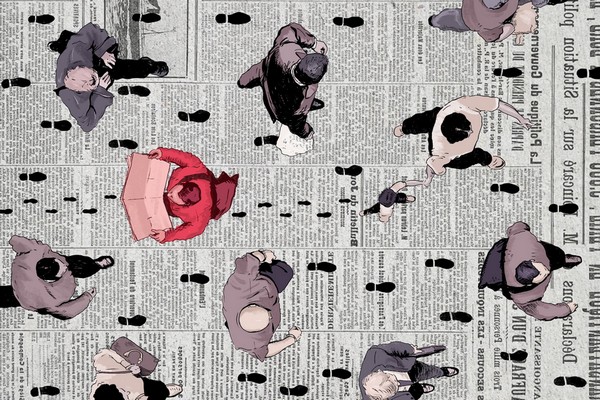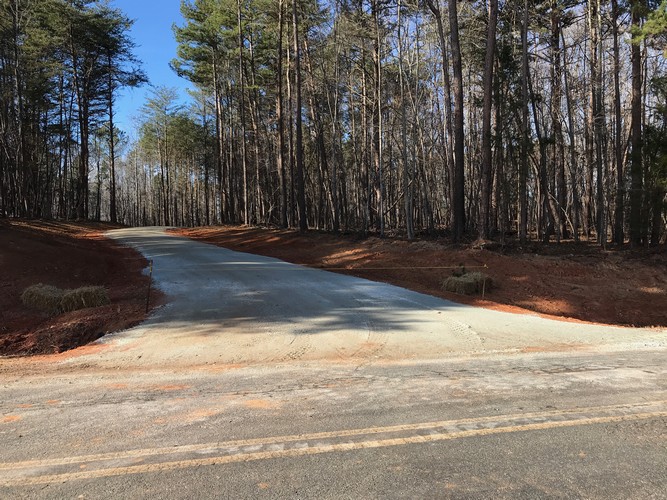TAT Forum
August 2019
Receive new-Forum notifications each month
Let your voice be heard
Enjoy the benefits of TAT membership
Become a TAT member
Help support TAT;
become a member today
|
As an Amazon Associate TAT earns from qualifying purchases made through links on our website. |

Convictions & Concerns
TAT members share their personal convictions and/or concerns
The Path to Enlightenment?
Is Becoming One with the screen of awareness the path to Enlightenment?

X
Using the analogy of a screen upon which all our thoughts appear during the visualization process, where all imagination, dreams, etc., play out. Is it this faculty, which is self-aware all by itself, that we need to hone in on in order to discover our true selves?
Y
How I see Richard Rose's "Process Observer": That part of us that observes our thoughts, our patterns, etc. The part of the eye marked in yellow is the individuality/personality filter through which we view our screen. This is our false identity obscuring the view of our true selves, "the screen," wherein lies our authentic self?
Z
This is observing the observer, our attempt at an individual consciousness of awareness. We dismantle our erroneous selves to get a clear picture of our true selves, becoming one with our true self?
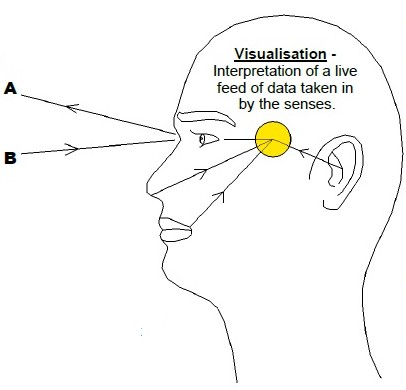
A
The outgoing projection concurrent with the incoming impression (B).
B
This is the incoming impression/percept that does not exist in the form that it does without the outgoing projection from a visualization process occurring where?
The visualization process is taken from J.J. van der Leeuw's Conquest of Illusion, a book recommended by Richard Rose.
The Umpire of a person is that part of us that gets involved and identifies with what appears on the screen. The umpirical paradigm is connected to the primitive promptings of a somatic body/mind that we are all subject to.
The concepts of Umpire, Process Observer, and Individual Consciousness of Awareness are taken from Richard Rose's Psychology of the Observer.

~ Thanks to TAT member Patrick Kinsella in Carlow, Ireland. Patrick is starting a self-inquiry discussion group and hoping to meet other seekers in his area. He can be contacted by .
Would you like to share your impressions or questions with other TAT Forum readers? Please email your comments to the .


TAT Foundation News
It's all about "ladder work" – helping and being helped
|
Falling for Truth: A Spiritual Death and Awakening by Howdie Mickoski is now available in paperback and in Kindle e-book format. Explore Chapter 1.
|
April 5-7, 2019 (Claymont Great Barn)
June 14-16, 2019 (Claymont Great Barn)
* August 16-18, 2019 (Claymont Mansion) *
November 1-3, 2019 (Claymont Mansion)
 Join us for TAT's August 16-18, 2019 spiritual retreat. Details & registration.
Join us for TAT's August 16-18, 2019 spiritual retreat. Details & registration.
 The following video recordings of presentations from a previous April TAT meeting are available on YouTube:
The following video recordings of presentations from a previous April TAT meeting are available on YouTube:

 Richard Rose spent his life searching for the Truth, finding it, and teaching others to find their Way. Although not well known to the public, he touched the lives of thousands of spiritual seekers through his books and lectures and through personal contacts with local study groups that continue to work with his teachings today. Meet Richard Rose is a 34-minute audio recording of an audiovisual presentation by Michael Whitely at the August 2017 TAT meeting that explores the arc of Richard Rose's life as seeker, finder, family man, and teacher.
Richard Rose spent his life searching for the Truth, finding it, and teaching others to find their Way. Although not well known to the public, he touched the lives of thousands of spiritual seekers through his books and lectures and through personal contacts with local study groups that continue to work with his teachings today. Meet Richard Rose is a 34-minute audio recording of an audiovisual presentation by Michael Whitely at the August 2017 TAT meeting that explores the arc of Richard Rose's life as seeker, finder, family man, and teacher.
 Downloadable/rental versions of the Mister Rose video and of April TAT talks
Remembering Your True Desire (details).
Downloadable/rental versions of the Mister Rose video and of April TAT talks
Remembering Your True Desire (details).
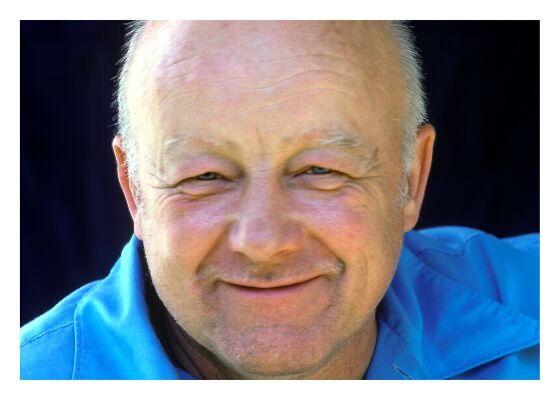
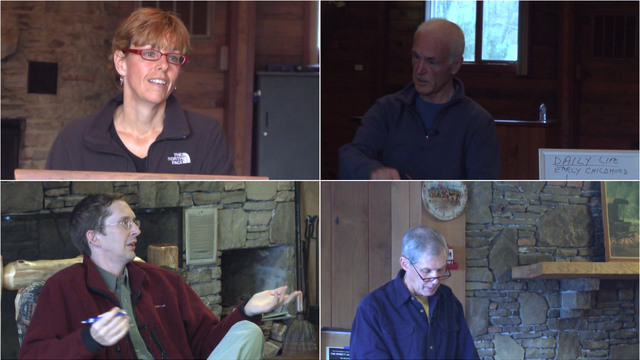
Local Group News
|
|

 Update from the Central New Jersey Group:
Update from the Central New Jersey Group:
The Central Jersey Self Inquiry Group has been meeting 2 times per month since our first meeting in early January this year. We have been averaging 5 participants at each meeting. Current outreach is our meetup.com page (above link) and word of mouth. Our most recent meeting topic was: "What is your biggest obstacle?"
~ Email
for more details.

 Update from the Central Ohio Non-Duality Group:
Update from the Central Ohio Non-Duality Group:
The Columbus group operated under the name OSU Self-Inquiry Group and met for many years in a church next to The Ohio State University. After attendance dropped off, the venue was changed to a local Panera restaurant, and the name changed to Central Ohio Non-Duality Group. The group has exposure to seekers through Meetup, but has only occasional visitors outside a core group of 4 people.
Due to schedules, we have met infrequently the past semester, and in deference to an effort to try to do other things, like rapport sittings, in private meetings.
Meeting format is a discussion format on topics of interest to seekers, and often bridges from the concerns, questions and interests of the core members in attendance into the topic which we intend to discuss.
See the rest of the update.
We continue to meet on Monday evenings at Panera across from The Ohio State University.
~ For further information, contact
or
.
We're also on Facebook.

 "Double Take on Life" blog
"Double Take on Life" blog
Two friends—one a TAT member, one a TAT friend; one living in Canada, one across the border in the US; one male, one female—have partnered to create a blog site, which they hope other TAT members and friends will enjoy and respond to.
"We are two friends who were encouraged to continue our spirited and free-wheeling conversation about life with a blog. This bipolar labor of love intends to roam between various forms of expression and perspective, both serious and amused. And traverse between the nitty-gritty of the everyday to the essence of being. As above, so below."

 Update from the email self-inquiry groups:
Update from the email self-inquiry groups:
An update on the women's self-inquiry group from Anima:
The Women's Online Confrontation (WOC) group consists of weekly reports where participants can include:
> What is on your mind?
> Any projects that you want to be held accountable for?
> Responses to a selected excerpt (in the previous report).
> Comments/responses/questions for other participants.
A philosophical/spiritual excerpt with two or three questions is included in each report.
Based on what we share, participants ask questions to help get clarity about our thinking.
The intention is to help each other see our underlying beliefs about who we are.
One rule we try to adhere to is not to give advice or solve problems.
The number of participants, to make it work efficiently, is between 4 and 7 including the leader.
Both the women's and the men's weekly email groups are active and welcome serious participants. ~ Contact or for more information.

 Update from the Gainesville, FL self-inquiry group:
Update from the Gainesville, FL self-inquiry group:
We continue to meet at the Alachua County library on alternate Sundays.
~ Email
or
for more information.

 Update from Galway, Ireland:
Update from Galway, Ireland:
Tess Hughes is currently working with seekers one-to-one and holding occasional group self-inquiry retreats.
Anyone who's interested in self-inquiry activity in Ireland is welcome to
contact
.
 TAT Press publishes Tess's easy to read, profound This Above All, the story of her journey of Self-Discovery.
TAT Press publishes Tess's easy to read, profound This Above All, the story of her journey of Self-Discovery.
 This is a new listing for the self-inquiry group in Goldsboro, NC:
This is a new listing for the self-inquiry group in Goldsboro, NC:
The Goldsboro Inquiry Group (GIG) meets on the first and third Monday evenings of the month. We begin the meeting with a short reading, then sit in silence for 20 minutes before opening it up to what I like to call group assisted self inquiry.
~ For details on when and where, contact
.
 Update from the Greensburg, PA self-inquiry group:
Update from the Greensburg, PA self-inquiry group:
The Greensburg Self-Inquiry Group is still in hiatus. I do plan to start it up again at some point as I see it as a lifeline to my own spiritual path. Things got stale with my group's participants, but I will e-mail them at some point to schedule another SIG meeting. In the meantime, I participate in a local "Socrates Cafe" group at the coffee house/art gallery where I have had my meetings. This group is not into esoteric philosophy as such, but they're supposed to be into "Socratic Inquiry," and I figure it's better than not engaging in any discussions with people. At least we sometimes touch upon spiritual matters, and this makes attending their meetings worthwhile.
~ Contact
if interested in local self-inquiry meetings.

 A new self-inquiry group is forming in Hartland, VT:
A new self-inquiry group is forming in Hartland, VT:
Located in central Vermont, along I-91, the group will be using TAT videos from past conferences as a primer for discussion.
~ Contact
for more information.
 Update from the Lynchburg, VA self-inquiry group:
Update from the Lynchburg, VA self-inquiry group:
We're currently using Alfred Pulyan's correspondence with Richard Rose as inspiration for our weekly gathering. We're perusing the letters during the week and then coming together to see what got our attention. This activity was inspired by several online groups who have used them in past years with good results. The women's group, run by Anima Pundeer, also inspired us as we already have some questions posed by Anima to go with each letter. It's always good to share additional questions among groups!
We continue to meet at The Drowsy Poet cafe at Little Dickens Bookstore, from 6:30-8:00 every Thursday evening.
~ Email
or
for information on the meetings.

 Update from the New York City self-inquiry group:
Update from the New York City self-inquiry group:
We meet every Monday in New York City's Financial District, where all great spiritual realizations take place ;) Our goal is to investigate and examine our beliefs (definition of examine: from Old French examiner "interrogate, question, torture"). We aim to serve as mirrors for each other, to see ourselves more clearly, in a group dynamic, within a safe environment. Recent topics include critiques of pema chodron, what it would be like to be god, and the consciousness of trees. If you believe something and are interested in doubting it, we are here for you :)
~ We have open meetings for first-timers; so if interested please reach out to
or find out more through our Meetup link above.
 Update from the Pittsburgh, PA self-inquiry group:
Update from the Pittsburgh, PA self-inquiry group:
We meet on the 1st & 3rd Wednesdays of each month, from 7-9 PM, at the Friends Meeting House in Oakland (4836 Ellsworth Ave, PGH 15213) and on the 2nd & 4th Wednesdays, also 7-9 PM, at Panera Bread in Shadyside (5430 Centre Ave, PGH 15232).
Last month's topics were:
July 3: "Beyond Understanding": An attempt to move past comprehension, past reasoning and conceptualization and rely upon feeling and intuition as our guide.
July 10: "Beyond Understanding" part 2: A continuation of quotations that might stretch our ability to comprehend.
July 17: "What is the most important ingredient in living a spiritual life? Friends? Gratitude? Satisfaction?" American spiritual teacher Adyashanti spells it out. Mike W. hosted.
July 24: "Does self actually Exist?" Is the one who travels a spiritual path and is reading this now, real?
July 31: "Meditation: Do you, how do you, and why?" A session to examine, question and re-invigorate what you are doing or hope to do in your meditation practices.
~ For further information, contact
or
.

 Update from the Portland, OR self-inquiry group:
Update from the Portland, OR self-inquiry group:
We have two kinds of meetings in Portland. One is a small closed group that meets at a local coffee shop. The format for this meeting is to give each person 20 minutes or so to talk about whatever is coming up for them in their practice. The other is an open meeting, held at a local library, that is advertised through Meetup. These meetings usually have a topic with questions, and the format is to give each person approximately 10 minutes to comment on the topic and then to answer questions from others. We haven't been holding open meetings regularly but hope to get them back on track for the new year.
~ Email
for more information.
 Update from the Raleigh, NC Triangle Inquiry Group:
Update from the Raleigh, NC Triangle Inquiry Group:
The Triangle Inquiry Group (TIG) meets on Wednesday evenings near NCSU. The inquiry process that we practice is essentially subtractive in nature, identifying 'what I am not', while exposing our false certainties and limiting beliefs; thus we are revealing the underlying truth of Who We Really Are. By asking honest, open, respectful questions that invite reflection, insight and the deepening of one's inner knowing, and by simply being present with our attention and sincerity, we create a space for direct seeing into true nature.
~ See the website for more information.

 Update from the Richmond Self Inquiry Group:
Update from the Richmond Self Inquiry Group:
The Richmond Self Inquiry Group has been off to a slow start, and is still seeking consistent participants. Once a small steady group is formed, this often attracts more interest and things evolve from there. The Meetup group is private, which aims to foster the creation of a committed gathering of individuals. Clearly there is a potential downside to this as it limits visibility and exposure to potentially interested persons.
For those reading about the group here through the TAT Forum, please know that you can certainly attend without being a member of the Meetup group, just shoot me an email any time if you're in the area and we can communicate about future meetups.~ Email
for information about upcoming meetings and events.
|
|
 Update from the San Francisco Bay area self-inquiry group:
Update from the San Francisco Bay area self-inquiry group:
See the Shawn Nevins interview by Iain McNay of Conscious.tv, kicking off the publication of Shawn's book Subtraction: The Simple Math of Enlightenment.
~ Email
for information about upcoming meetings and events.
Members-Only Area
A password-protected section of the website is available for TAT members. The area contains information on product discounts for members as well as a substantial amount of helpful and historical information, including audio recordings, Newsletter archives, Retrospect archives, policies, conference proceedings, business meeting notes, photographs, and suggestions for ways to help.
 TAT's June 2019 Spiritual Retreat Weekend was titled Between You and the Infinite. The following audio recordings are coming soon to the members-only website area:
TAT's June 2019 Spiritual Retreat Weekend was titled Between You and the Infinite. The following audio recordings are coming soon to the members-only website area:

- "Coming Home (aka The End of Seeking)" by Don Oakley, and
- "What's in the Way?" by Eshwar Segobind.

 TAT's April 2019 Spiritual Retreat Weekend was titled Once in a Lifetime is Now. The following audio recordings are now available in the members-only website area:
TAT's April 2019 Spiritual Retreat Weekend was titled Once in a Lifetime is Now. The following audio recordings are now available in the members-only website area:
- "Recognizing the Human Dilemma" by Norio Kushi,
- "Strategies for Self-Realization" by Bart Marshall,
- Untitled session by Paul Hedderman, and
- "A Session in the Now" by Paul Rezendes.


 TAT's August 2018 Workshop was titled Beyond Imagination and included three guest speakers who each led separate workshops. The following audio recordings are now available in the members-only website area:
TAT's August 2018 Workshop was titled Beyond Imagination and included three guest speakers who each led separate workshops. The following audio recordings are now available in the members-only website area:
- "Nurturing What We Are" with Jenny Clarke,
- "The Art of Seeing" with Norio Kushi, and
- "Seeing Through Imaginary Traps" with Shawn Pethel.



 TAT's June 2018 Gathering was titled In Search of Happiness. The following audio recordings are now available in the members-only website area:
TAT's June 2018 Gathering was titled In Search of Happiness. The following audio recordings are now available in the members-only website area:
- "Four Views of Happiness: Three steps beyond the search" by Avery Solomon,
- "How You Can Be 'Free of Happiness'" by Gary Weber,
- "A Personal Perspective on Friendship: Ode to 'Mrs. C.'" by Larry Inderbitzin, and
- "Seeker Stories and Q&A" by Michael W., Penny W., and Michael R.
Please us if you have questions. (Look here for info on TAT membership.)
Amazon and eBay
|
As an Amazon Associate TAT earns from qualifying purchases made through links on our website. TAT has registered with the eBay Giving Works program. You can list an item there and select TAT to receive a portion of your sale. Or if you use the link and donate 100% of the proceeds to TAT, you won't pay any seller fees when an item sells and eBay will transfer all the funds to TAT for you. Check out our Giving Works page on eBay. Click on the "For sellers" link on the left side of that page for details. |
Your Contributions to TAT News
TAT founder Richard Rose believed that working with others accelerates our retreat from untruth. He also felt that such efforts were most effective when applied with discernment, meaning working with others on the rungs of the ladder closest to our own. The TAT News section is for TAT members to communicate about work they've been doing with or for other members and friends. Please your "ladder work" news.

Humor
"One thing you must be able to do in the midst
of any experience is laugh. And experience
should show you that it isn't real, that it's a
movie. Life doesn't take you seriously, so why
take it seriously." ~ Richard Rose, Carillon
|
"Egotist," noun: A person more interested in himself than in me.
People who think they know everything are very irritating to those of us who do. ~ Unknown
Right now I'm having amnesia and déjà vu at the same time. I think I've forgotten this before. ~ Steven Wright
Lord: Lead me not into temptation. I can find it myself.
~ Anonymous
There is only one way to find out if a man is honest: ask him. If he says yes, you know he is crooked. ~ Groucho Marx * ~ From Spiritual Humor compiled by Timothy Conway.
|
|
|

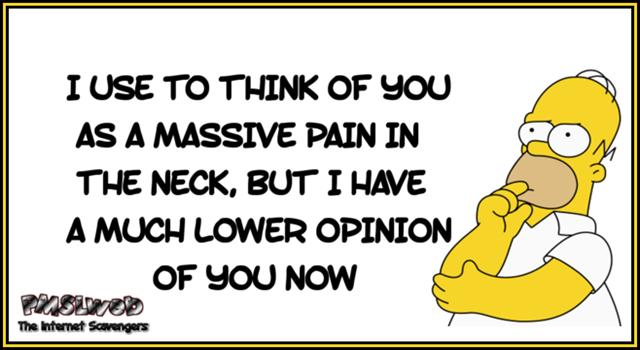

 We're hoping to present more humor from TAT members and friends here. Please
your written or graphic creations. Exact sources are necessary for other submissions, since we need to make sure they're either in the public domain or that we have permission to use them.
We're hoping to present more humor from TAT members and friends here. Please
your written or graphic creations. Exact sources are necessary for other submissions, since we need to make sure they're either in the public domain or that we have permission to use them.

Inspiration & Irritation
Irritation moves us; inspiration provides a direction
|
This Article Won't Change Your Mind
See The Atlantic for the complete article by Julie Beck. Illustration by John Garrison.
Q: If faulty beliefs prevent self-realization, knowing our true identity, how do we go about challenging them despite all the resistances? |

|
Only barbarians are not curious about where they come from, how they came to be where they are, where they appear to be going, whether they wish to go there, and if so, why, and if not, why not. ~ Isaiah Berlin, Latvian-British political philosopher (1909-97)
I have a new philosophy. I'm only going to dread one day at a time. ~ Charles Schulz, American cartoonist (1922-2000)
The average man does not know what to do with his life, yet wants another one which will last forever. ~ Anatole France, author (1844-1924)
He who knows nothing is closer to the truth than he whose mind is filled with falsehoods and errors. ~ Thomas Jefferson, most influential Founding Father of USA and 3rd President (1743-1826)
Imagination was given to man to compensate him for what he is not; a sense of humor to console him for what he is. ~ Sir Francis Bacon, British scientist-philosopher-essayist-statesman (1561-1626) * ~ From Spiritual Humor compiled by Timothy Conway. |

|
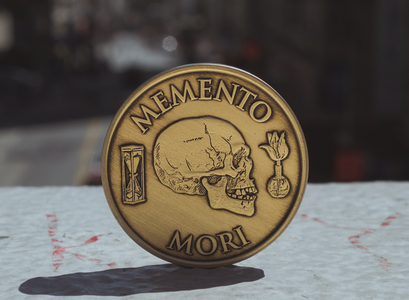
* Thanks to TAT friend Tim H. for a link to the Daily Stoic's Memento Mori medallion, which in turn led to their Interview With BJ Miller and Shoshana Berger. |

Please
your thoughts on the above items.

Reader Commentary
Encouraging interactive readership among TAT members and friends
|
A reader wrote that what would make the Forum more interesting would be: Hearing from people who are searching – and have questions instead of those providing endless advice and "answers." What challenges they are facing. What their doubts and questions are. How they perceive their path is going. What they are doing in their lives. Where they think they will end up. Etc. etc. Can you help make the Forum more interesting? |
 The question we asked readers for this month's Reader Commentary:
The question we asked readers for this month's Reader Commentary:
When you hit a barren patch in your search, when answers are not forthcoming and you feel stuck, what do you do to not lose direction and stay focused on the work, inquiry, looking, etc.?
Thanks to TAT member Colm H. for this question. Responses follow.
 Tara S:
Tara S:
Thanks for the great question and the chance to think about this. There are two sides to how I deal with staying focused on my search for Truth. These days, I'm trying to emphasize more positive ways to stay directed and handle the frustration when my patience is tested or I seem to be stagnating. Sometimes I write in my journal, pick up an inspiring or thought-provoking book or reach out to another seeker friend [not often enough, probably]. Or I try to become more aware of what is causing the angst or blockage by simply sitting in self-inquiry. But, at times, I will distract myself with something to "ease the pain." Fortunately, it's not as self-destructive as it once was [like mind-altering substances or dysfunctional relationships] but I can still engage in habits like eating for entertainment, binge watching movies or other media, or wallowing in self-pity. Regardless of how I end up dealing with it, I've realized the barren patches are bound to happen with the flow of life so I try to remember to accept that inevitability, be patient and ride with the tide. What often helps is to remind myself that, as I am not privy to the "big picture" yet, behind the scenes something may be occurring that I'm unaware of and answers that I will eventually understand are generating. So perhaps the barren patch is exactly what needs to happen, a kind of gestation period, and the best thing I could possibly do is just go take a nap.
 From Lauren T:
From Lauren T:
The question is how do we keep our focus when we hit a barrier.
These are a few thoughts that came to the surface at 3 am this morning.
Accept what is. Life is what happens while we are making plans.
But, how do we know what truly is happening and who is accepting it?
Give up the illusion of control. And surrender to what is.
But who is it that is giving it up?
We are like a child sitting in the backseat of our parent's car
Happily steering our toy steering wheel while our parent
Does the real work.
And still knowing all of this, I fall back into the Dream with
Fear and anxiety.
I was on the road recently trying to get to a meeting and my
Mind was full of worry and concern after watching a news
Item. Then, I looked around me and it was such a perfectly
Beautiful day and a smile occurred.
It is where we put our intention and attention that makes the difference.
The Past is Depression and the Future is Fear, the only place
Of looking is the ever present, embodied, NOW.
 From Benedict James:
From Benedict James:
These days, if I feel stuck I generally stop trying, I just get on with living. I allow life to play with me and don't worry about it; it's not long before something comes up. There are times when I go 'off the rails' a bit; for example, I might find myself indulging a compulsion: drinking, eating, travelling, socialising, shopping. I've also had moments where alcohol consumption got out of hand.
The thing is, eventually, I always find that I come back to the same spot, just a little wiser. The lessons sometimes have been painful, and perhaps there are a few more to come. Sometimes I see that it's escapism, that I'm running away from discomfort; at other times I'm simply in the Doldrums, so to speak. Either way, when I come back to the path, I have learned to forgive myself. A psychotherapist said to me that to allow myself to play with life was ok—with one caveat—she said "do no harm". And I think she meant to oneself as much as to others.
I used to feel very guilty and beat myself up about moments where I lost track. And this guilt or sense of inadequacy, who did it serve? I can see that it served only to feed the separate-self with a story that I'm not good enough, not worthy, not doing it right.
Now I've come to see that playing, taking a break or indulging a distraction is sometimes quite helpful and not a setback at all. The negatives can sometimes be a positive … it's relative.
To be honest, I'm not sure there's anything better I could have done with the difficult periods. They were difficult because I feel I somehow needed them. What I've noticed at any of these stuck moments is resistance. It comes either as mental turmoil which seeks relief, or bodily tension, which also seeks relief.
As time has gone by I can see that seeking relief from these turmoils and tensions probably just held up the whole 'process'. I've grown in courage and strength to turn towards these turmoils and tensions—but I didn't have the clarity and faith to do this until relatively recently.
Below are two analogies that might be useful. I've done a lot of physical training over the years and I've found that resting the body is as important as it is to train. In fact, I would say that resting is MORE important than training; it's in the resting periods that the magic happens, where muscle growth occurs. I follow a training program where I lift weights for around 45 minutes but only train 3 times per week, for maximum muscle growth. That's 45 minutes of training followed by a minimum of 47 hours and 15 minutes of rest. And two sleeps.
A second analogy: I used to play piano and it was an obsession for many years. I played at every opportunity, often practising 4 or 5 hours per day. I learned a great deal about practice technique and how to maximise improvements in the shortest period of time. The greatest (and perhaps the most difficult) lesson to learn was to walk away from the piano once a session was complete. At the end of practice I often realised that my technique or speed wasn't perfect and wasn't where I wanted it to be, but I came to understand that it was only through rest, particularly a good night's sleep, that the learning took place. Only ego wanted me to push on. If I played on and on, sometimes to the point of mental and physical exhaustion, I found to my cost that I stagnated and made little or no progress. The harder I tried to force the learning process, the slower the progress I made when it came to learning a new piece. Excessive effort was holding me up.
If I was struggling to perfect a fast and difficult passage, I would practice slowly and accurately, and only build speed once I could play it perfectly from memory, at a slow, steady pace. I would practice hands separately, introducing hands-together practice at a painfully slow speed, slowly building muscle memory until again, the practice was effortless. Then I would allow speed to build. Sometimes, even after great diligence and consideration, I had to concede that I wasn't ready to play a particular piece and it was time to stop, the piece was beyond me, at that moment. And perhaps a year or two later I would come back to the same piece and discover to my surprise that it was within my faculties to learn. I also learned the distinction between amateur and professional: an amateur practices until they get it right; a professional practices until they can't get it wrong.
In a roundabout way, I've unwittingly adopted these practices in the spiritual search. Perhaps the weight-training or piano-practice are useful analogies, perhaps not, but if it's the body-mind that we're 'training' here, then allowing the opportunity to rest and relax and to be open to new paradigms may be of significance.
I'm not advocating escapism here, merely that it's ok to allow oneself a pause. I'm well aware that we must face our discomfort. I don't advocate eating two pounds of cheddar cheese after weight-training nor do I advocate punching a wall after a piano practice that didn't go well. But I would like you to entertain the idea that taking a break, allowing oneself an indulgence or sinking briefly back into an old habit without guilt or remorse may not be the disaster the inner critic would have you believe. Most of us have a very strong inner critic. Watch that critic and see who it serves. You may come to see that the old habit that once served you so well is an empty chalice and no longer satisfies.
I would also add that good sleep, eating healthily, exercising regularly and intermittent fasting, have also been very helpful tools in keeping my mind open and malleable. Looking after the body is looking after the mind. If you can't find something to do 'spiritually' then why not take care of the body. There's a wonderful mental clarity and lightness that good quality sleep, eating simply and taking exercise seems to evoke in me, and I'm fairly certain they have been helpful in keeping my mind flexible and relaxed.
Over the years I have continually tried to question the certainties that I've based life upon. The path has been a continual reflection and disintegration of these certainties. How can an exhausted and strained mind have the flexibility and youthfulness to entertain a whole new concept? How can an overused mind sink into the heart? How can a rigid and overworked mind entertain the possibility that you are not a single, separate entity?
It's my feeling that, in part, we are trying to break-through and unseat an ingrained paradigm, ingrained certainties that we've bought into since birth, and letting go of the paradigm that 'I am separate' is not necessarily easy; it's a task where the mind needs all the help it can get.
Another way to look at this would be to say that we, all of us, are always seeking, we just don't always know it and are not aware of it. The stuck patches might be a gift, or an opportunity to do nothing. I've done a lot of sitting on park benches over the years, simply soaking up nothingness. When a stuck patch comes, perhaps you are being invited to investigate space, nothingness and stillness? Relax into That.
 From Patrick C:
From Patrick C:
Most of us are aware that resisting what is occurring at this moment
is discouraged by many enlightened people. Yet we continue to resist
things. Sometimes we forget that whatever we are feeling is also part
of the present moment. Therefore, welcome the feeling of stuckness.
Everything is allowed, even uncomfortable thoughts and feelings.
Everything IS and is a part of creation and therefore sacred. Our
stuckness is sacred as well! Welcome it and flow with it.
 From Oleg K:
From Oleg K:
First of all, I would need to determine what this stuckness or barren patch is as much as possible. It might be related to not accepting something my life is pointing me to, and that can create internal resistance, blocking my attention/energy from getting "unstuck." Also sometimes I can be judgmental, telling myself that there's no good progress when in fact there is something going on subconsciously and I'm not in position to judge it. One thing to note maybe is that it's my personality feeling dissatisfied with being stuck, but the observer is ok with whatever.
Now what do I do about such situations? First—try to really notice that the observer is ok with any negative or positive evaluation of my situation.
Second—remember that when I dropped the search-related activities altogether, my dissatisfaction with "regular life" grew stronger, and dissatisfaction/fears, such as fear of death, will not go away until some understanding/experience is gained.
Third—notice and feel this restless energy that wants to freely move through me, see what I put it into regularly (for me a lot of it might be overcoming my inertia to complete some kind of plan in the social/material world), and then remember that a particular form/achievement will never really free/unblock this energy because it's directed toward something more (the Source?), and so there is no way but to continue on the path.
Of course, in real life situations, I don't always have these ideas ready in my mind to deal with stuckness, but thinking about this question brought them up.
 From Richard G:
From Richard G:
My initial response is to try a self-analysis, i.e.,
a self-inquiry. The self inquiry's aim is to deconstruct (question) the perception or thoughts
associated with spiritual progress.
Examples of questions that may facilitate a change in beliefs include:
"What does progress on the spiritual path mean?"
"How do you measure progress on the spiritual path?" "What is the method to gauge your progress or lack of progress?"
"Where is it written that progress SHOULD be made on the path?"
"What are you demanding or believing should happen on the spiritual path?"
"Who is the being on the spiritual path?" or "Who is this I?" "Who is viewing or observing the spiritual unfolding?"
Secondly, it may be helpful to locate and communicate with a teacher, a recognized teacher, about the difficulties, issues, or concerns you are dealing with or experiencing.
The TAT website lists websites and ways and means to email and communicate with teacher(s). For no fee or charge, one can also access the TAT Archives to read about various issues, practices, roadblocks, etc.
 From Patrick K:
From Patrick K:
Shawn Nevins uses the term called, "treading water." To me it means to remain where you are by not backsliding, to hold your ground, which is very important to everyone, I would say, on their path. I find reading books on psychology very interesting. I find looking into all the research they are doing on near-death experiences or even reincarnation to stimulate more esoteric interest. There is so much interesting stuff on YouTube like TED talks, existential stuff to question the origins of it all, scientific looks at the brain, etc. I find Iain McNay's interviews on Conscious TV very stimulating, as they give a wide range of people's experiences, but it may be limited to non-duality alone and the raising of consciousness. It differs from Richard Rose's work on self-definition and finding an absolute answer, but I find it fills a gap now and then, and there are at least 5 interviews with TAT teachers on it. I would get a copy of The Albigen Papers and study what Rose says about building a vector, and see where I can start applying this to myself—and if this is your practice, just look to revise it and intensify efforts. And if you get the opportunity of a solitary retreat, jump at it, and really look at your idea of stuckness. Dwell on it, and give it loads of time and consideration as to how you're being impeded on your path; and devise your strategy of how to break through your obstacles. I am a strong believer in Rose's saying, "If you throw enough mud at the ceiling, some of it will stick."
 From Bill K:
From Bill K:
I know those barren patches all too well, and actually fear them. It's like a dead zone, the horse latitudes of spiritual seeking where the spirit or the heart seems to not be present, leaving behind a zombie-seeker. It's the stuckness experienced not as an inability to sit down to meditate, read or write, but the numbness I feel at times when I do sit down but nothing "happens." For example, I could sit to read and comprehend but something in me just doesn't "get it"; feelings aren't elevated. The desire to look and seek is not inspired, nothing in me seems to sit up and take notice of what is alluded to, what cannot be spelled out to one asleep, especially by those authors who "have been there." It is as if grace (if it were ever here) has abandoned me, and the fear is that what may have embraced me could have been lost and might never return. As dire as that sounds I have found poetry, writings by a couple Christian mystics, and especially the writings of a few people that I have personally met that may have made the trip and who have an uncanny knack of pointing to what is not obvious. It's as if the personal contact allows something to be remembered, as if some signpost planted can inspire. Whatever had fallen aloof seems to wake up again and supersede mundane perception. That having been said, if I can manage to hang in there, perhaps those ups and downs and the extremes are the gifts where an abundance of opportunity and insight lie in store for the seeker.
 From Paul Constant, in a personal letter from Richard Rose dated October 6, 1988 :
From Paul Constant, in a personal letter from Richard Rose dated October 6, 1988 :
As you know the foregoing is only one step in the "Path." Our steps are marked by doldrums followed by
intervals of "wising up" and a feeling of confidence.
I have gone through these doldrums and points of achievement. I liken them to mileposts on the road. And I mention them to give hope to the person in the doldrums.
It is not enough to just be celibate…this some people think. It is necessary to find a "way of life" that will carry us beyond the doldrums. Meaning a vector.
The seeker, in the beginning, may identify the doldrums as just bad luck, or inescapable astrological emanations. When the Observer notices the relentlessness of the doldrum mooks [Quoted exactly as it stands in the original; could be a typo for "moods" but may be a slang term meaning foolish or contemptible. - Editor], he cannot help but come to the conclusion that intelligent, adverse forces are at work.
With this realization, the "way of life" will be planned in better detail. This planning is a function of the "ways and means committee."
The mileposts are now visible behind the student. At this point, there is again a distress that may lead to a doldrum. It seems that there is no "next step" that will bring about another milepost.
Only when a group is formed, is there a view of more mileposts.
|
A related pair of Reader Commentary questions, from two TAT members, for next month: If you were going to simplify your life, what would you do first? What do you need to subtract NOW? Please your responses by the 25th of August and indicate your preferred identification (the default is your first name and the initial letter of your last name). |
 Other Reader Feedback
Other Reader Feedback
 From Mike B:
From Mike B:
[Referencing last month's Reader Commentary question: "Do you feel that there's something wrong with you? If so, do you feel that you need to be fixed? What do you think it would take to fix what's wrong with you?"]
On the subject of feeling whether there is something in me which needs to be fixed: I have felt this way for a long time, but more recently I have come to understand that it is really nothing more than a failing to see myself clearly. When I temporarily drop the personal identity and see from the clear awareness that is who I really am, the feeling of incompleteness goes away for a moment. When this happens out on the street I've noticed that strangers may smile at me. I've no idea why….
 From Author Still Unknown [also referencing last month's Reader Commentary question]:
From Author Still Unknown [also referencing last month's Reader Commentary question]:
"What do you think it would take to fix what's wrong with you?" No one suggested to get rid of self.

Q:
What are your thoughts on this month's reader commentary? Please
your feedback.

 Richard Rose described a spiritual path as living one's life
aimed at finding the meaning of that life.
Did you find anything relevant to your life or search in this month's TAT Forum?
Richard Rose described a spiritual path as living one's life
aimed at finding the meaning of that life.
Did you find anything relevant to your life or search in this month's TAT Forum?

Cat's Eye Nebula, from How the Hubble Space Telescope Captured the Cosmos.

We like hearing from you! Please
your comments, suggestions, inquiries, and submissions.
 Sign up for notices of TAT's four annual events and free
monthly Forums by email on our .
Sign up for notices of TAT's four annual events and free
monthly Forums by email on our .

Founder's Wisdom
Richard Rose (1917-2005) established the TAT Foundation
in 1973 to encourage people to work together on what
he considered to be the "grand project" of spiritual work.
What Is the Truth?
Let us look at this question in a direct manner. I imagine that very few take the question seriously because they really do not expect an answer. This means that it is presumed that such a question, because it embraces everything imaginable, – cannot possibly be answered directly. So it is presumed that we are about to indulge in a farce, or in a bit of bantering to show the inadequacy of the answerer.
My first premise is that a direct answer can be given to this question, but the answer will and must vary according to the position or previous capacity of the questioner.
When a judge in court demands to hear the Truth he is only asking for the truth about a specific event, – as to whether it did or did not occur.
When a person without any previous philosophic study asks the above question (one which related to the True status of all things), he may be asking a question for which there is no answer for him. But if a person asks the question who has pondered the question carefully over a long period of time, – he will almost certainly not expect a literal, logical, and all-embracing answer. The question relates to the questioner, – meaning that a wise man or well informed and self-questioning man who asks the question "What is the Truth?" will convey the weight of his enquiry, – and may receive a specific type or a profound answer presuming that the questioner believes an answer is possible.
If he does not believe such an answer is possible, – then he may be toying with the mind of the teacher, or he may be challenging the authority and communicability of the teacher or answerer. If he does not believe such an answer is possible, – he should not ask, of course.
However let us presume that in certain cases the question is an honest one, and note the apparent type of questioner in relation to the type of answer which we might expect for them.
Let us take:
- The illiterate and non-contemplative man.
- The literate but emotional man, perhaps a man of artistic temperament, of keen appreciation but one who has a disdain for logical encounters.
- The literate but fanatic man who does not know but believes he knows, – who has a closed mind.
- The literate but diffident man. The man who is willing to ask and listen but does not expect much.
- The logician. The man who will belabor the teacher for buttons to push, and for formulae that must be orderly if not mathematical.
- The arm chair philosopher, – who plays mind-games for the sake of ego.
- The serious student who honestly admits his emptiness despite long periods of examination of philosophic questions. This man can be in any walk of life, or in any religion or discipline.
We all know that the answer to each of these types would be different, – nor would there be a standard type of response to different types if complete cataloguing of type were possible. The response by the answerer (let us use the term teacher) would still be varying depending upon the intuition of the teacher as to the best way to get through to the questioner.
Let us assume that we are first questioning someone who knows the Truth in that he or she know the origin of Life, the purpose of Life, and the quality of individual consciousness after death, as well as the relation of his person to the cosmos. There may be more to know but it will suffice for the definition of "one who knows" or the "teacher."
The let us take for the questioners, the different types listed, and speculate on the different type of answers which might have to be given by the teacher to be of full or fractional value to them.
When we do we can immediately recognize that the burden of answering lies primarily with the questioner. This is not stated to imply that the questioner must answer his own questions, or be tricked by the statement into remaining silent. It implies that in the offset, the questioner must convey both the nature of his question, and his individual ability to understand words directed to that level and degree of realization which he already has, – or pretends to have. Sometimes the teacher must answer first with a statement which will affect a change in the questioner, before he can reach him on the actual not pretended level of his mental receptivity.
The mind rebels against any indication or pointing at its own inadequacy. And this reaction is not limited to idiots. In philosophic lectures we find that the principle hecklers, or egotistic exhibitionists are chiefly those with considerable education and reading along the lines of a parallel but different philosophy or religion. Most critics begin with the assumption that they are qualified to be critics. Often they do not bother to go through the necessary task of trying to pick up the sincerity of the speaker, let alone apply some intuition to the choice of words used by the speaker in the latter's efforts to contact the mind of people listening. Nor does the critic take into account that in a room of a hundred people, that a hundred different approaches may be necessary to touch the understanding of all of them ... and such cannot be done with a single lecture. Consequently, the book may have an advantage over the lecture, but it can only reach certain types of minds, and for every one of the hundred who picks up the book ninety-five may react negatively to it.
I would like to cite a couple of accounts of reaction to the student who momentarily or consistently does not have the ability or faculty to understand the teacher. The first is perhaps crudely drawn from a situation where the student may seem to be in need of our support and sympathy, and the teacher may well be a tyrant, – but the purpose of the account is to describe the change of mind or change of being that precedes acceptance of the message of an accepted authority.
In the first case, we take the frequent encounter of the policeman with the drunk, who must realize that he must be removed from his car, or from driving because he is endangering others. The drunk does not believe that he is drunk, – he may even think that his awareness is improved by the alcohol. And he may convey this to the officer in disdainful terms. The officer, according to his intuition, may do one of several possible things to convince the drunk. He may try to reason with the person, or he may place him under arrest. Then if the drunk is still abusive because he refuses to see himself as a drunk and a danger, the policeman may finally resort to beating the man on the head with his club. After a short period of this attack the man will, in some cases come quickly to the complete conviction that the officer is right and that he is wrong. I have encountered quite a few men with head injuries and multiple, stitched-up head cuts, and when I learned of the brutality which they experienced, I questioned their tolerance of the abuse, indicating that perhaps they were eligible for legal recourse. Invariably they would not have any desire to retaliate.
The treatment which the drunk expects may be accepted because he believed in guilt and punishment, having perhaps been raised in a religious family that taught their children to feel unworthy and to be humble, but never properly instructed them on the fine line between abject humility and self-annihilation.
There is another method of arriving at conviction. This method uses emotion as a channel. We are all acquainted with the accounts of the lover being seduced against principle, or of the lover being transformed, converted or even destroyed by the magic of emotional hypnoses which caused him or her to reverse convictions. I remember a very close friend who was raised a Catholic. He served in the navy during World War II, and was overseas for four years, during which time he regularly attended mass. He expounded in his letters a profound belief in the rectitude of his country, and the infallibility of his church. After the war he met a woman who immediately became a mental catalyst. She was a shouting fundamentalist, and within a few months he had joined her church. He found her to be right in all things. She reasoned that the country was in incapable hands, and in imminent danger of communism, so they both joined the Ku Klux Klan, and the Minutemen. After a while they parted from the Klan, gave up the old time religion and started drinking after she reasoned that she needed extra energy to carry an ever-expanding body.
Again, let us remember that these instances are given to illustrate only varying methods of education. When they are used to change peoples' minds it is imperative that they are used by an infallible administrator. And we find that such is not always the case, even in matters transcendental or spiritual.
Zen is one of the methods or systems which, in a number of schools (which generally emanate from Japan), practice the use of physical force, or keisaku. And Zen, according to ancient tradition, is a Truth-system of the highest order and of maximum promise in the goal of enlightenment. It makes us wonder which type of enquirer would approach Zen in search of answers. Perhaps we might infer that those who believe in physical punishment are those who would approach the harsher Zen schools, – also those who might believe either in Karma or in guilt. I knew for a while a Zen teacher who practiced a system of personality confrontation instead of the keisaku practiced in other Zen seshin. He told me that the most suspicious and difficult students that he had were Catholics or Buddhists, – and I am sure that they would be even more difficult in the keisaku seshins, – unless they were confirmed masochists.
*
To be continued in the September 2019 TAT Forum….

Homing Ground Update… A spot on earth where people can do retreats and hold
|
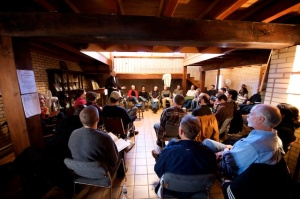
Did you enjoy the Forum? Then buy the book!
Beyond Mind, Beyond Death is available at Amazon.com.




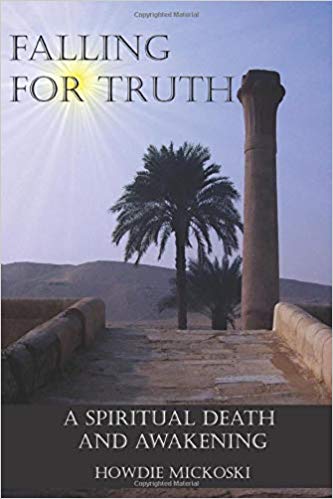 TAT Press's latest publication....
TAT Press's latest publication....
 A new self-inquiry group is forming in Carlow, Ireland.
~ Contact
for more information.
A new self-inquiry group is forming in Carlow, Ireland.
~ Contact
for more information.



